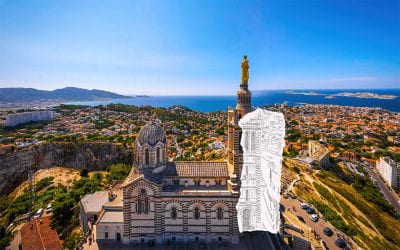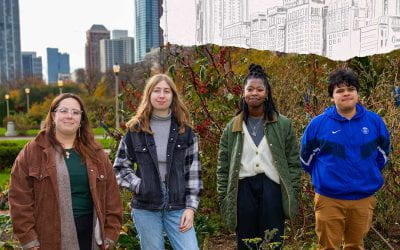President's Perspective
Spring/Summer 2020By President Ali R. Malekzadeh, PhD

Seventy-five years ago, Central YMCA College President Edward Sparling refused to prepare a census of the racial and religious composition of the student body for the Board of Trustees. The Board wanted to use the census to impose restrictive quotas on socially undesirable groups. “We don’t count that way,” Sparling told them. He resigned in April 1945, and a courageous group of faculty and students followed him. Roosevelt University was born out of that principled stand in favor of a vision of social justice that was diverse and inclusive. From its first day, the University would offer admission to any qualified student.
This is a familiar story for the community at Roosevelt, but what is perhaps less familiar is how radical a break this was from the prevailing norms at the time. Despite the horrors of the Holocaust and the national repugnance toward the Nazi regime’s theories of racial superiority, the U.S. military was still segregated in 1945, as was much of American society. Legal segregation would continue to rule the South for another two decades until the Civil Rights Act of 1964. Many local school districts in the South would remain segregated even longer, despite the Supreme Court’s ruling against school segregation in its famous 1954 decision Brown v. Board of Education.
Colleges and universities at the time were no exception to this injustice. Most imposed strict admissions quotas on groups they saw as “undesirable.” These quotas affected not just black students but Jewish and Catholic students and women as well. Many of these restrictions would remain in place at various schools well into the 1960s and even the 1970s.
Because of the success of the Civil Rights Movement and the strides that we have made in recent decades, it is easy to imagine that the inclusivity and diversity embraced by Roosevelt University at its founding are now the ethical norm throughout the land. Sadly, that is not the case. Even after 75 years, fighting for equity in education and in our society remains more important than ever.
You do not have to look hard to find numerous signs that the commitment to inclusivity and diversity is under threat. You can see it in the rise of white nationalist groups. You can see it in the surge of hate crimes against Asian Americans during the COVID-19 pandemic. Sadly, you can even see it in our educational system as federal courts have issued a number of decisions that have rolled back some of the gains made in desegregating our schools and diversifying our student bodies.
At Roosevelt University, we are proud of our founding commitment to inclusivity. The nation’s founding began with a similar promise with its stirring commitment to the revolutionary idea that “all men are created equal.” Over the last 200-plus years, our nation has made huge strides to make that bold promise a reality for more and more people, but the journey remains unfinished.
Martin Luther King Jr. said, “The arc of the universe is long, but it bends toward justice.” I believe those words, but I also know that it only bends if enough of us work hard on behalf of the cause of justice. The Roosevelt community has always been a part of the struggle not just to make sure our University embodies the principles of inclusivity and diversity but to try to promote those values in the wider world. And we will continue to be a part of that great task because equity is as important and as relevant today as it was back in 1945.
As we mark Roosevelt’s 75th anniversary, the University community is redoubling our efforts to support students facing unprecedented barriers to completing their education. As of April 2, our alumni, faculty, staff and friends have raised almost $50,000 to cover students’ emergency expenses. The University recently created a new fund, the Stronger Tuition Grant Fund, to aid students with tuition during times of hardship. To learn more about our COVID-19 relief efforts, please visit our website.
Please do not hesitate to write me your thoughts and ideas about Roosevelt University at amalekzadeh@roosevelt.edu. As always, I look forward to hearing from you.
With warm regards,
Ali R. Malekzadeh, PhD
President
More in this section
unexcused absence
Some of life’s most important lessons cannot be taught inside the four walls of a classroom. Matthew Beardmore’s travel has forced him to reassess how he thinks about work, family, politics, injustice and many other issues. He’s no longer tied to the beliefs of where he grew up.
traveling while home: self-discovery through the local
How can you make the long trip home if you don’t actually leave there? A partnership between Roosevelt University’s Honors Program and Chicago Architecture Center asks students to experience space and place as sites for action—not simply places we passively inhabit.
creating a new travel niche while wandering the globe
In early 2011, Sahara Rose De Vore bought a one-way ticket to Costa Rica. Over the next 10 years, she explored 84 countries. The self-discovery she experienced inspired her to launch two successful businesses—both helping others discover the benefits of travel.



